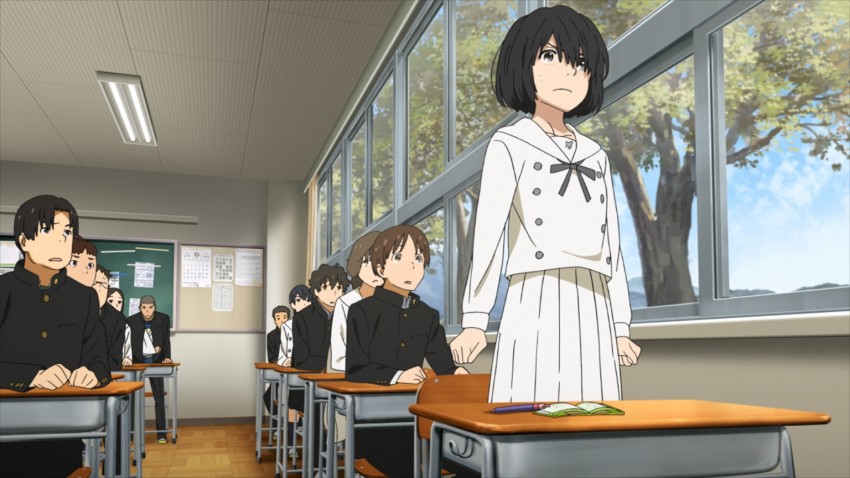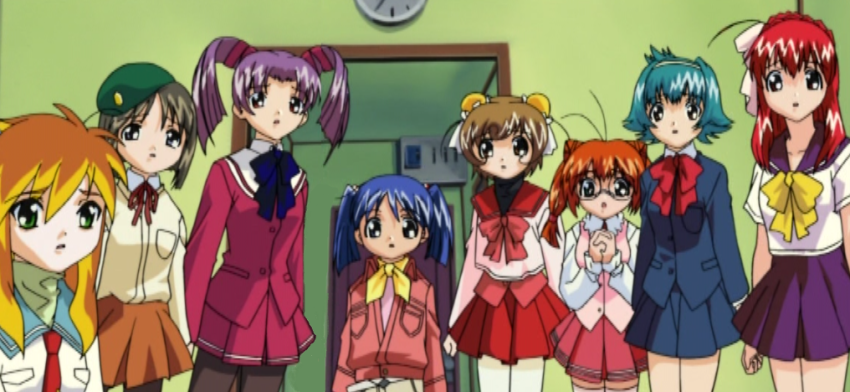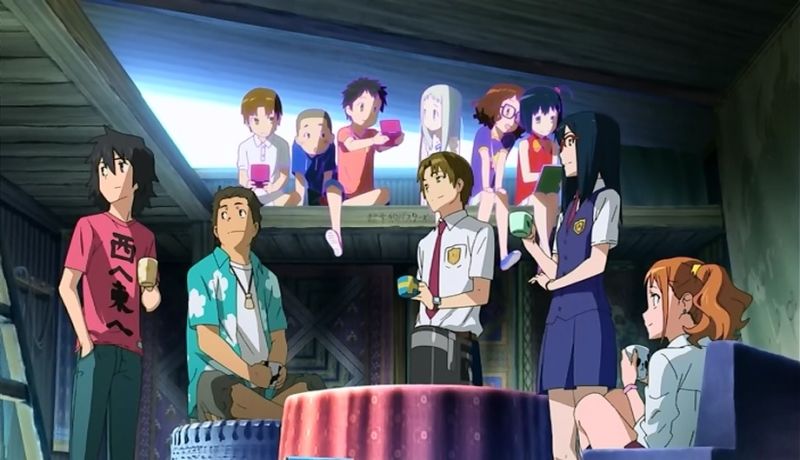Books: From Truant to Anime
May 7, 2018 · 0 comments
By Jonathan Clements.  Mari Okada’s memoir of two decades in the anime business begins and ends with the disastrous premiere screening of Anthem of the Heart in her hometown of Chichibu – a huge event in the middle of nowhere, inconvenient for all attendees, with a film that stops playing halfway. As the screenwriter, she fumes impotently as the patrons wait and flunkies try to look busy, and watches with head-shaking resignation as the celebratory fireworks, timed to coincide with the end of the film, are launched too early while the audience is still waiting for it to restart.
Mari Okada’s memoir of two decades in the anime business begins and ends with the disastrous premiere screening of Anthem of the Heart in her hometown of Chichibu – a huge event in the middle of nowhere, inconvenient for all attendees, with a film that stops playing halfway. As the screenwriter, she fumes impotently as the patrons wait and flunkies try to look busy, and watches with head-shaking resignation as the celebratory fireworks, timed to coincide with the end of the film, are launched too early while the audience is still waiting for it to restart.
From Truant to Anime Screenwriter: My Path to Anohana and The Anthem of the Heart is her account of how she got to that place, as the writer of a standalone film. Her writing is distinguished by a constant resistance to the performativity of Japanese life, refusing to play the game of empty accolades and fake-news proclamations that all is well. Instead, she presents a compelling portrayal of a life (and industry) that constantly “fails up”, until she becomes one of modern anime’s rare hyphenate talents.
 Okada’s account of her schooldays balances a dispassionate, matter-of-fact account of teenage depression with the risibly performative antics of her classmates and teachers. What starts out with the difficult child being the butt of classroom jokes blossoms into a writer’s-eye view of Japanese school, in which both pupils and teachers seem to be working from a playbook inspired by primetime drama. Rather than trying to solve her problems, one of her teachers puts on a show of doing so, seemingly inspired by a dozen TV serials about trouble-shooting educators. Like the insincere brats of 24 Eyes, tearful girls show up at her house to say she has “gone missing”, neglecting to mention that they are the bullies she has fled from. And as her weeks of absence stretch into months, both pupils and teachers periodically visit to enact a ritual of giving a toss.
Okada’s account of her schooldays balances a dispassionate, matter-of-fact account of teenage depression with the risibly performative antics of her classmates and teachers. What starts out with the difficult child being the butt of classroom jokes blossoms into a writer’s-eye view of Japanese school, in which both pupils and teachers seem to be working from a playbook inspired by primetime drama. Rather than trying to solve her problems, one of her teachers puts on a show of doing so, seemingly inspired by a dozen TV serials about trouble-shooting educators. Like the insincere brats of 24 Eyes, tearful girls show up at her house to say she has “gone missing”, neglecting to mention that they are the bullies she has fled from. And as her weeks of absence stretch into months, both pupils and teachers periodically visit to enact a ritual of giving a toss.
This kind of material is out of fashion in modern biography. Authors are usually encouraged to skip over all the childhood trauma and growing pains, and to avoid Psychology 101 explanations for later creative decisions. Okada, however, devotes fully half of her book to her school days, to set up many of the inspirations for key scenes in her anime scripts, and the underlying triggers for low points in her career. But something else is working beneath the surface – an ardent, angry polemic against the easy fixes of Japanese etiquette and TV formula. Okada speaks for a generation of teenage shut-ins, raised in a broken home and schooled among spiteful conformists, surrounded by asinine media messages that one should simply do one’s best and collect stickers, and that everything will sort itself out in 42 minutes plus adverts.
Several of her teachers do make diligent efforts to save her. Submitting homework from her sick-bed, she is still writing promising prose, one essay of which is submitted to a newspaper by her teacher and wins an award. When her teacher suggests that Okada devote her truant life to entering writing competitions, the teenage Okada immediately assumes that this is a scam to keep her of use to the school, even in absentia, but in fact it is one of several attempts by her educators to reach her through the one thing she plainly excels at.
Even then, she can’t resist being contrary. Asked to write an essay on the preservation of Mount Buko, she resists the easy and obvious temptation to talk about ecology and the environment, and instead writes a provocative piece about how the mountain is an eyesore and a barrier to transport, and she hopes it is gone sooner rather than later.
As the end of middle school approaches, Okada is both confronted and vindicated by the rules of the Japanese school system. With her terrible attendance record, she is disqualified from graduating from middle school. But if she passes the entrance exam to a high school, the middle school will have no choice but to pass her. A similar loophole gets her through high school, and propels her to Tokyo to enrol in a college that specialises in gaming.
With both teachers and pupils given over to relentlessly unoriginal scripts, happy to end every work with an airy promise that “the battle has only just begun,” Okada leaps ahead. It turns out that her middle-school years of constant literary criticism have a pay-off after all – she is unafraid of constructive comments, and powers on through the self-doubt that ruins most would-be writers before they can finish anything. Determined to find any niche that pays, she submits an erotic film script on spec. It sells, despite its flaws, and she begins her career as every screenwriter should, being forced to read out her own crappy dialogue at a meeting, and then asked if she really thinks an actor will be able to say it with a straight face.
 In the immediate boom of new media post-Evangelion, Okada finds herself working in anime. Her lack of school acculturation, which in earlier generations might have made her a tin-eared choice for teen drama, becomes an asset in an age where anime’s target market favours if not the drop-out and the shut-in, then at very least the non-conformist. All her characters are in pain, one colleague tells her, as well they might be in an industry where she can earn more as a stenographer than as a screenwriter.
In the immediate boom of new media post-Evangelion, Okada finds herself working in anime. Her lack of school acculturation, which in earlier generations might have made her a tin-eared choice for teen drama, becomes an asset in an age where anime’s target market favours if not the drop-out and the shut-in, then at very least the non-conformist. All her characters are in pain, one colleague tells her, as well they might be in an industry where she can earn more as a stenographer than as a screenwriter.
Okada coyly does not name many of the early shows she works on, although anyone familiar with her work will immediately recognise them. She fondly describes working on Angel Tales (an anime with “the most ridiculous premise” about a boy whose 12 girlfriends are reincarnations of his dead pets), both for the simple joy she takes in writing it, and for the habit of its young voice-actors for calling her “the story lady.” She finally feels that she has arrived, but…
It’s only here that Okada’s multiple chapters on her miserable school life really pay off, when Angel Tales fandom derides her as a “piece-of-shit writer” who deserved to die, because she had “betrayed” the manga. It is Okada’s first true encounter with a whole order of magnitude of bullies – internet trolls. Her professional career, intended as an escape from dealing with others, turns out to only expose her to a deluge of defamatory and malicious comments from angry fanboys.
 When the director Tetsuro Amino demands that she write about who she is and where she comes from, she digs back into her school days for the script that would become Anohana: The Flower We Saw That Day. It remains incomplete at first, however, because Okada is unable to deal with the character of the mother – she can write from the position of teenage self-regard, but isn’t yet unable to empathise with the suffering of the mother of a wayward daughter.
When the director Tetsuro Amino demands that she write about who she is and where she comes from, she digs back into her school days for the script that would become Anohana: The Flower We Saw That Day. It remains incomplete at first, however, because Okada is unable to deal with the character of the mother – she can write from the position of teenage self-regard, but isn’t yet unable to empathise with the suffering of the mother of a wayward daughter.
She is thirty years old before her desire to say something original connects with a willingness to delve into her own past for material. Seemingly, working with an unnamed apprentice on Hanasaku Iroha pushes buttons in her that made her appreciate how her mother must have felt dealing with her as a teenager. She returns to her Anohana script, twice abandoned in earlier incarnations, and writes her mother as the woman her mother wanted to be, and herself as a truant that can somehow eventually become loveable. When the script wins a competition, she is allowed to select the director and designer she wants, and suddenly the writer becomes a producer. She finds herself working with other talents of her own age, on a project that means something to her: “I didn’t have to stand on tiptoes just to fit in.”
Okada is a reluctant celebrity, ruing the day that she didn’t select a pen-name, now having to change hair-dressers so she doesn’t have to talk about anime. She feels first-hand the embarrassment of setting a thinly disguised memoir in her own hometown, likening the tourist spin-offs in her native Chichibu as “a dodgy self-help seminar.” Anime’s penchant for Holy Land tourism soon puts her mother’s house on a tour map of Chichibu, where the baffled lady hands out oolong tea to a string of visiting fans.
Okada is open about jealousies among the production team, many of which seem to be generated by the tone of press coverage that describes Anohana as “her” story. When the same team start work on Anthem of the Heart, she reports director Tatsuyuki Nagai treating all positive comments on her script as negative criticism of him. It is only as they sit, ignoring each other, in the production booth at the run-through, that she comes to appreciate the pressures that he, as director, would have also been under.
From Truant to Anime Screenwriter finishes in 2015, before Okada began work on her critically acclaimed feature film Maquia. But since it was only published in Japanese a year ago, its swift passage to English translation is something to be celebrated. Translator Kim Morrissy delivers a brisk English version that carefully renders the jokes and childhood taunts in a manner that non-Japanese readers will appreciate. Possibly, licensing issues prevented her from footnoting the more sharp comments about certain industry figures, although anyone reading with Wikipedia open to Okada’s bio will swiftly be able to work out who is who in most cases.
Sometimes, one wishes for a slightly more scholarly approach, particularly on issues of slang that go unexplained. One teacher is described as having a “bar-code head” for example, and I am not sure that the average English reader will know that means that he has an unconvincing comb-over. Notably, however, Morrissy’s work is the first non-fiction publication from J-Novel Club, a publisher which is to be commended for snapping up something that looks behind the scenes of the anime industry, and a glimpse at the troubled path to success of one of modern anime’s names-to-watch.
Jonathan Clements is the author of Anime: A History. From Truant to Anime Screenwriter is published in English by J-Novel Club.
Leave a Reply